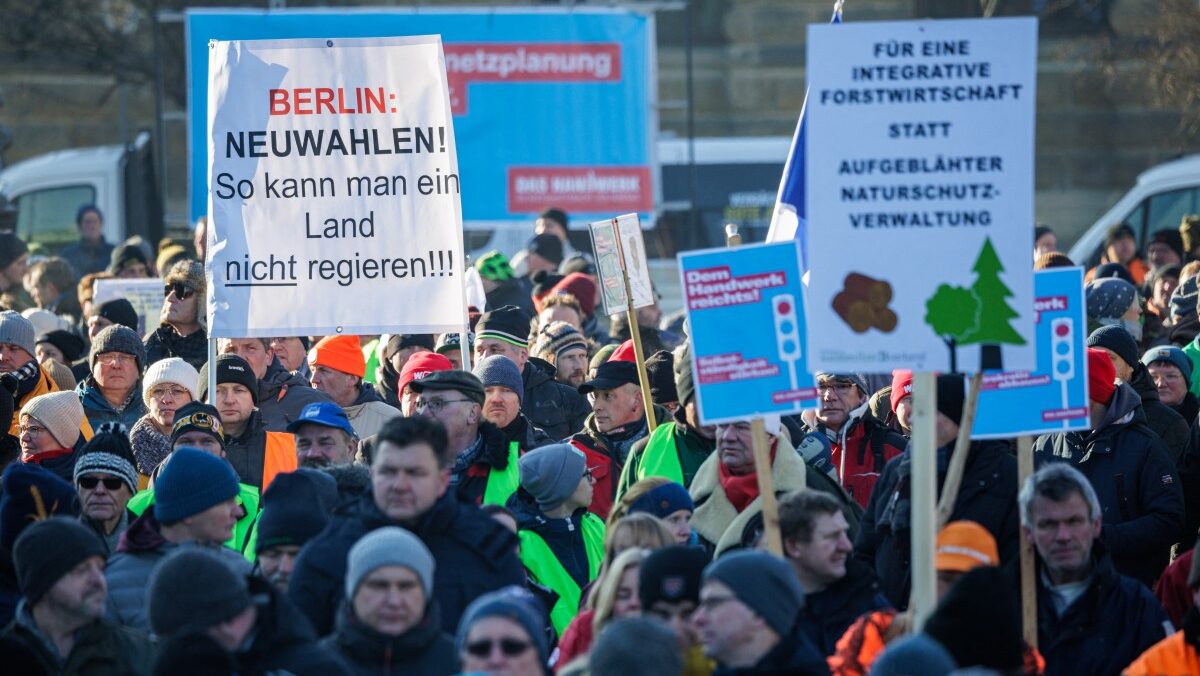
Farmers hold up placards claiming among others new elections as they demonstrate against government plans to scrap diesel tax subsidies for agriculture vehicles in Dresden, eastern Germany, on January 10, 2024.
Photo: Photo by JENS SCHLUETER / AFP
German farmers’ protests continue, with a third consecutive day of demonstrations across the country against Olaf Scholz’s planned cuts to diesel subsidies.
Incessant media attempts to label the protests as ‘extreme right’ are failing to convince the wider public. On Wednesday, Rainer Wendt, federal chairman of police union Deutsche Polizeigewerkschaft, described such accusations as a “malicious” smear campaign by the government against what he called a “democratically performed” and “very orderly and disciplined protest.”
Earlier in the week Vice Chancellor Robert Habeck, increasingly seen by farmers as a hate figure, tarnished the protests as a tool of extremists as he warned about “fantasies of subversion” among the crowds. Habeck was joined by the German state media broadcaster DW, whose coverage of the demonstrations was top heavy with warnings about the ‘extreme right’ in the form of the populist AfD party and nationalist Identitarian groups.
Following Monday’s mass demonstrations, farmers took to the streets in regional towns and cities across Germany on Tuesday against green austerity. Amid signs of the government’s resolve on the issue slowly weakening, Joachim Rukwied, President of the German Farmers’ Union, announced “tomorrow we will do it again” in response to a partial reversal of the cuts planned by the Scholz cabinet.
Die Bauern unterstützen.
— James Melville (@JamesMelville) January 9, 2024
Support the farmers.#GermanFarmers
🇩🇪🚜pic.twitter.com/ruEN3kgwzG
As promised, on Wednesday morning all motorway entrances to the city of Brandenburg were temporarily blocked off. Security is being heightened around Chancellor Scholz as the German premier prepares to visit the town of Cottbus, a hotbed of agrarian discontent with farmers expected to attempt to disrupt his visit by sealing off the city using tractors to force a showdown.
Despite the ‘extreme right’ smear, the farmers’ protests are attracting broad-ranging public support. Even Green Party Minister of Agriculture Cem Özdemir publicly conceded that the demonstrations had merit and that the traffic light coalition had to sit down and deal with their grievances.
🇩🇪 BREAKING | We’re live in Erlenbach where Cem Özdemir, the German Minister of Food and Agriculture just got greeted by a fed up crowd of farmers and citizens telling him to "piss off!".
— Eva Vlaardingerbroek (@EvaVlaar) January 9, 2024
A dozen children on plastic tractors were shouting: “For the farmers!’’ #Bauernproteste pic.twitter.com/nRKU63xscJ
Parallel to the farmers’ protests, rail strikes are expected to add to the coalition’s woes as workers on the German public rail network begin a three-day strike caused by a dispute over pay and conditions.
Formerly regarded as a stable European social democracy, Germany has been destabilised politically over the past two years as the country’s ailing green-left ruling coalition battles rising energy prices, a rolling asylum crisis, and poor handling of the Ukrainian war, as well as a recent blow to its fiscal plans caused by a calamitous court ruling which placed the country’s green transition in financial jeopardy.
